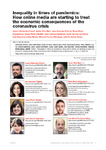Inequality in times of pandemics: how online media are starting to treat the economic consequences of the coronavirus crisis

Use este enlace para citar
http://hdl.handle.net/2183/35341Coleccións
- Investigación (FCOM) [208]
Metadatos
Mostrar o rexistro completo do ítemTítulo
Inequality in times of pandemics: how online media are starting to treat the economic consequences of the coronavirus crisisAutor(es)
Data
2020Cita bibliográfica
Odriozola-Chéné, Javier; Díaz-Noci, Javier; Serrano-Tellería, Ana; Pérez-Arozamena, Rosa; Pérez-Altable, Laura; Linares-Lanzman, Juan; García-Carretero, Lucía; Calvo-Rubio, Luis-Mauricio; Torres-Mendoza, Manuel; Antón-Bravo, Adolfo (2020). “Inequality in times of pandemics: How online media are starting to treat the economic consequences of the coronavirus crisis”. Profesional de la información, v. 29, n. 4, e290403. https://doi.org/10.3145/epi.2020.jul.03
Resumo
[Abstract] In December 2019, Chinese authorities informed the World Health Organization about a new coronavirus disease that
would come to be called Covid-19. The world media began reporting on this new virus and its consequences. However,
reports about Covid-19 would not appear in the European and American media until their societies became aware of
both the health and economic consequences of Covid-19 in March 2020. This article analyzes the online media coverage
of economic inequality. The goal is to understand the formation of the public agenda, based on the impact of the disease
on social classes as the main factor generating greater inequality levels, in particular inequality of opportunities as the
most remarkable topic during the first stage of the pandemic. According to the first results of this content analysis, the
social class divide will be deepened by the pandemic. For this study, a tool was designed to analyze both the manifest
and latent content of the items. Using content analysis, an analysis of news published by 33 digital media in both Europe
and Latin America from March 14 to April 14, 2020 was conducted. The results of this study show that income inequality
appears as the core variable of the problem, although social classes remain important. The imbalanced access to health
and education public services also receives continuous coverage in the media. However, poverty as a consequence of
this situation remains an uncomfortable issue and tends to be presented in an undramatized way.
Palabras chave
COVID-19
Coronavirus
Pandemics
Digital media
Income inequality
Inequality of opportunities
Digital journalism
Spain
Europe
Latin America
Social classes
Coronavirus
Pandemics
Digital media
Income inequality
Inequality of opportunities
Digital journalism
Spain
Europe
Latin America
Social classes
Versión do editor
Dereitos
Atribución 3.0 España
ISSN
1699-2407






